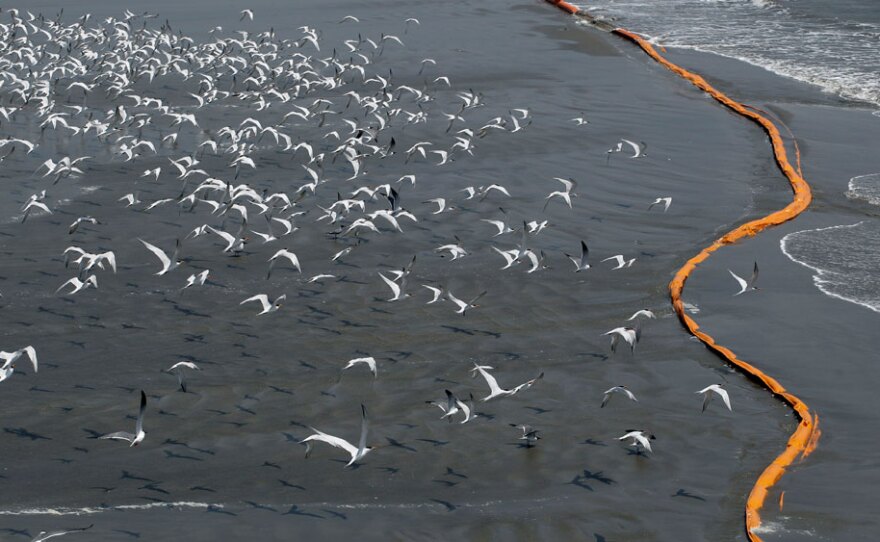Heavy winds continued to whip up high waves on the Gulf of Mexico on Saturday, thwarting attempts to contain the growing slick that's washing ashore in southern Louisiana and threatening the Mississippi and Alabama coasts. Rough waves rolled over containment booms, pushing oil-slicked water closer to shore, where wetlands and other fragile ecosystems stand at risk.
President Barack Obama planned to visit the region Sunday to assess the situation amid growing criticism that the government and oil company BP PLC should have done more to stave off the disaster. Meanwhile, efforts to stem the flow and remove oil from the surface by skimming it, burning it or spiking it with chemicals to disperse it continued with little success.
The Coast Guard conceded Saturday that it was nearly impossible to know how much oil has gushed since the April 20 rig explosion, after saying earlier it was at least 1.6 million gallons -- equivalent to about 2 1/2 Olympic-sized swimming pools. The blast killed 11 workers and threatened beaches, fragile marshes and marine mammals, along with fishing grounds that are among the world's most productive.
BP has not said how much oil is beneath the Gulf seabed Deepwater Horizon was tapping, but a company official speaking on condition of anonymity because he was not authorized to discuss the volume of reserves, confirmed reports that it was tens of millions of barrels.
The spill should eclipse the 1989 Exxon Valdez incident as the worst U.S. oil disaster in history within about a week. But a growing number of experts warned that the situation may already be much worse.
The sheen has reached into precious shoreline habitat and remains unstopped. That has raised fears that the ruptured well could be pouring more oil into the Gulf than the 200,000 gallons per day initially estimated.
Meanwhile, the Minerals Management Service ordered two oil and gas operators to stop production in the Gulf and another evacuated as a safety measure Saturday because of the growing slick.
In Alabama, an estimated 500 commercial fishermen, shrimpers and others associated with making their living from the Gulf and surrounding waters crowded inside the Bayou La Batre Community Center on Saturday to hear what government officials and BP representatives plan to do to help offset losses caused by the oil spill.
At least another 500 men, women and children waited outside to get in.
A poor sound system muffled BP spokesperson Ruth Rendon's attempts to announce a phone number that those affected by the disaster could call to make a claim for $5,000 or more which, if approved by BP, could be mailed within a week.
But people like Charles Graham, a commercial fisherman, said what he could hear didn't satisfy him.
"Five thousand dollars isn't enough," he said. "What am I going to do at 63 years old?"
Graham said that after Hurricane Katrina, it took more than six months for him to receive any compensation from the government. "Who's gonna pay my truck and boat notes months from now once my credit's ruined? We're not looking for handouts, we just want to keep my crews working."
Rendon also gave a number for people to offer their labor, boats and equipment in the cleanup effort.
That angered Ben Harvard. "They should have called on us in the beginning to help. There's thousands of us already set up and ready to go. These are our waters, we know them. [The booms are] just flotation devices. We could've been putting them out immediately."
His anger was echoed by Maurice Ryan, who operates a bait shop on Dauphin Island. "All that money [paid to independent contractors to help clean up the oil] should go to local folks instead of out-of-towners."
The meeting ended abruptly with officials exiting through a guarded door, leaving the crowd frustrated that it was not allowed to ask any questions.
But just before the conclusion, Bayou La Batre Mayor Stanley Wright's boisterous voice could be heard telling the crowd: "Work with your organizations if you have them but don't sign anything BP gives you."
The federal government says there are nearly 2,000 people involved in the response effort, with additional resources being mobilized as needed.
The attorneys general from Alabama, Florida, Mississippi, Louisiana and Texas will meet Sunday in Mobile, Ala., to discus legal options, strategies and preparations for the spill.
Asked if the states may file lawsuits against BP and other firms, a spokeswoman for Florida Attorney General Bill McCollum said he is looking at all possibilities.
Lawyers for private plaintiffs including fishermen have filed at least 26 potential class action lawsuits so far.
Debi Foster contributed to this report.
Copyright 2022 NPR. To see more, visit https://www.npr.org. 9(MDAzMjM2NDYzMDEyMzc1Njk5NjAxNzY3OQ001))






